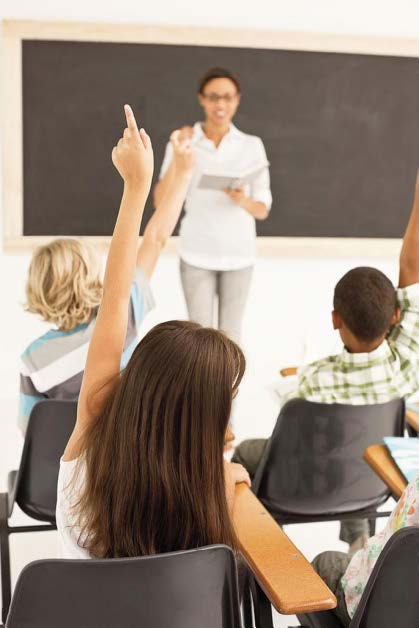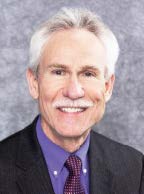
How Massachusetts schools use music, yoga, and more to inspire special learners
BY JAMES V. MAJOR, IOM CAE
All across America, more and more classroom teachers are moving to "personalized instruction" and "personalized learning" as the key to inspiring all their students to reach their maximum potential.
For Massachusetts schools that focus on providing the highest quality education to students with special needs, personalized instruction is just as exceptional as the "exceptional children" being served: starting every day with a music-theory brain teaser; supporting a non-verbal student leading yoga classes through his speech device; helping a blind student identify a scientific question she's passionate to explore for a science fair.
The organization I lead, the Massachusetts Association of 766Approved Private Schools (maaps), represents 81 schools across our state who serve about 7,000 children with special needs. The large majority are public school students from Massachusetts whose home districts are unable to provide the specialized education and services these children need. maaps member schools also serve publicly funded children from other states and countries, as well as Children from families who pay privately. We call our"I have been so selves "exceptional schools for exceptional children," and as I've talked with member schools across the state, I have been, over and over, so impressed and impressed when I learn about all the member schools across the state. I want to share with you just a few stories that illustrate the range of ways exceptional children energized when I learn about all the creative approaches they are taking to educating these exceptional kids and helping them achieve all they are capable of doing. I want to share with you just a few stories that illustrate the range of ways exceptional children can make exceptional progress in school.
At the Landmark School in Beverly, Massachusetts, a coeducational day and residential school for students in grades 2 through 12 diagnosed with dyslexia and other language-based learning disabilities, Jack Bram arrived in the fall of his 6th grade year with significant expressive language needs–and a profound love of music.
What veteran teacher Mary Kahn – an accomplished pianist and former singer in her own right–realized as she began working with Jack was that he had musical skills and interests far beyond his years, and that his love for music could open a door to all kinds of learning. Mary started beginning each day with a music theory brain teaser. Discussing concepts like the 12-tone chromatic scale, tonic and dominant chords, and the "circle of fifths" became a way for Jack to expand his skills in communication and a great lead-in to the daily work of language remediation in tutorial. Jack's work in music theory complemented his blossoming accomplishments as a multi-instrument musician who now performs in a rock band, jazz band, and a bluegrass band and is a prolific composer of songs.
"What Mary will tell you is that Jack worked proficiently on brain teasers developed for music majors studying at the college level," says Susan Tomases, director of marketing and communication at Landmark School. "How Jack has blossomed as an overall student and learner through his love of music is really a perfect example of what our founder, Chad Drake, had in mind when he established Landmark in 1971. He knew there were all kinds of students with great talent in a variety of areas, but whose reading, writing, spelling, and math skills did not match their superior thinking and problem-solving capacities. Some of our core principles here are to provide opportunities for our students to experience success and include them in the learning process with multiple modalities and student-specific micro-units and tasks. Jack, who's now moving into 8th grade, is a fantastic example of Chad's vision in action."
At the May Center for Autism and Developmental Disabilities in Randolph, Massachusetts, yoga has for many years been one of many ways the Center supports children's health, energy, and wellness. "T," who is 13 and on the autism spectrum, uses a Nova Chat speech-generating device to communicate. He has also been an especially enthusiastic yoga participant. P.J. Simeone, the director of allied health services at the May Center, and other staff got an idea: What if T could become a yoga class leader?
"We're always looking for new ways that we can teach our kids to use their communications devices in ways that empowering and fun for them," P.J. says. "T is not fully verbal, but he loves to cheer people on and loves engaging with his fellow students in sports and bowling and games."
T worked with his teachers to create a series of yoga phrases to activate from his Nova Chat such as "Namaste" (the traditional Indian greeting, meaning "I bow to you," that begins and ends a yoga session), "Circle up," "Next position," "Downward Dog," and "All done." It's proven to be a lovely way to encourage T in his learning and development of skills, by tapping into something he's especially passionate about.
For more than a decade, the Perkins School for the Blind in Watertown, Mass., has held its Perkins Science Fair, offering students a chance to show off what they've learned in class, by working either individually or as part of a team to complete a project. It's also an opportunity for students to sharpen crucial components of Perkins's "expanded core curriculum," including social interaction and communication skills.
ABOUT MAAPS The Massachusetts Association of 766 Approved Private Schools (maaps) was founded in 1975 as a statewide association of approved private special education schools dedicated to providing educational programs and services to students with special needs. Maaps members are approved by the Mass. Dept. of Elementary and Secondary Education under the state's special education law, Chapter 766. maaps represents 81 member schools serving approximately 7000 children with special needs from Massachusetts, other states and countries. Membership in maaps signifies a commitment to excellence and ethical integrity. maaps is concerned that all children with special needs have access to appropriate, high quality educational experiences and treatment options which are necessary for their individual growth and development.
"They're learning how to present to an audience, how to greet people, how to say please and thank you and how to look at the person they're talking to. They're working on so, so many skills," says Kate Fraser, a Secondary Program teacher at Perkins. "It's a great opportunity for students to come and put everything together."
The most recent science fair last year demonstrated the extraordinary range of students' personal interests and ability, even with their blindness, to evaluate and articulate complex concepts in biology, chemistry, astronomy, and other fields of science: A display, using eggshells, to demonstrate how various liquids affect tooth enamel and overall dental health. A project tracking how different chemicals impact the properties of water. A project testing how long it takes a kicked football to pass through the goalposts from different points on a field.
Ashley, a 19-year-old secondary student who hopes to become a psychology major in college because she's fascinated by "what makes people tick," developed a project – complete with displays of snakes and spiders – on how people's fears evolve over time.
"I think over time, people outgrow their fears and develop new ones to take their place," Ashley explains. To test that hypothesis, Ashley asked people around campus to fill out a questionnaire with the hope of learning what made people afraid at different points in their lives and how those fears changed over time. "It's interesting how fear evolves," Ashley says.
The Perkins Science Fair, Fraser explains, goes beyond sparking "an interest in a specific area of science. It's great because the students may learn about a specific item of interest to them, which might someday become a hobby, or even a career."
Personalized learning at maaps member schools goes well beyond the classroom. At the Kennedy Day School (KDS) at Franciscan Children's Hospital in the Brighton neighborhood of Boston, Jimmy Tierney leads an Adaptive Physical Education program tailored to meet students' unique needs and skills.
Located on a beautiful, welcoming campus full of playgrounds seamlessly connected to Franciscan Children's, a renowned pediatric rehabilitation hospital, Kennedy serves 84 students aged 3 to 22 with significant, complex needs from more than 30 cities and towns across Massachusetts. In 14 large, accessible classrooms, Kennedy's teachers and staff provide highly specialized services addressing areas such as communication, mobility and motor control, vision, hearing, feeding, cognition, social development, and fragile health.
Every day, Jimmy is looking for new, innovative and inclusive ways for each student to participate in his gym class. Using equipment adapted to meet their unique needs, students participate in fun games and activities like football, baseball, volleyball, and bowling with Tierney and KDS teachers. It's a class that also does high-impact work strengthening their social skills, personal interests, and self-esteem.

REACHING AND GROWING: At the end of the day, nothing means more to an exceptional parent of an exceptional child more than seeing them achieve, succeed, and grow, in whatever way that can come to life.
"If there is anything that a child can do, Jimmy finds a way to make A.P.E. work for them," says Pat Donovan, Assistive Technology Specialist at the Kennedy Day School.
If a student in a wheelchair, for example, is not able to round the bases independently after hitting a home run in baseball, for example, a KDS staff member might wheel them from base to base to ensure that the student feels the same excitement as any other child playing the sport. In a recent bowling lesson, Jimmy placed a ramp in front of students who have difficulty controlling their limbs and movements, so they could place the ball on the ramp to roll down the alley for a strike.
"Ideally," Tierney explains, "we strive to help students be as independent as possible which can be anything from articulating basic wants and needs, to being able to pick a teammate in A.P.E., or even something as seemly small as using a smile, any small gesture, or slight wrist motion to initiate their own turn. It's fun to celebrate the big achievements, but when you get to know the students of Kennedy Day School as well as we do, and you know the effort being put in by the students and team members alike, each and every small achievement becomes a large one."
At the end of the day, nothing means more to an exceptional parent of an exceptional child more than seeing them achieve, succeed, and grow, in whatever way that can come to life. Sometimes it is tapping into a love of music or yoga. Sometimes it's identifying a passionate personal interest for a science fair. Sometimes it's a one-of-a-kind gym class.
Every day, I am so grateful to know and see, our schools are finding at least 7,000 other ways to help our 7,000 students learn and grow in every way they can.•

ABOUT THE AUTHOR: James V. Major, IOM CAE, is Executive Director of the Massachusetts Association of Chapter 766 Approved Private Schools (maaps). Jim is a Certified Association Executive with the American Society of Association Executives. He has served as Board member and President of the New England Society of Association Executives.